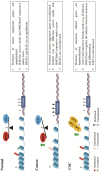Key actors in cancer therapy: epigenetic modifiers
- PMID: 31320814
- PMCID: PMC6620032
- DOI: 10.3906/biy-1903-39
Key actors in cancer therapy: epigenetic modifiers
Abstract
Epigenetic reprogramming plays a crucial role in the tumorigenicity and maintenance of tumor-specific gene expression that especially occurs through DNA methylation and/or histone modifications. It has well-defined mechanisms. It is known that alterations in the DNA methylation pattern and/or the loss of specific histone acetylation/methylation markers are related to several hallmarks of cancer, such as drug resistance, stemness, epithelial-mesenchymal transition, and metastasis. It has also recently been highlighted that epigenetic alterations are critical for the regulation of the stemlike properties of cancer cells (tumor-initiating cells; cancer stem cells). Cancer stem cells are thought to be responsible for the recurrence of cancer which makes the patient return to the clinic with metastatic tumor tissue. Hence, the dysregulation of epigenetic machinery represents potential new therapeutic targets. Therefore, compounds with epigenetic activities have become crucial for developing new therapy regimens (e.g., antimetastatic agents) in the fight against cancer. Here, we review the epigenetic modifiers that have already been used in the clinic and/or in clinical trials, related preclinical studies in cancer therapy, and the smart combination strategies that target cancer stem cells along with the other cancer cells. The emerging role of epitranscriptome (RNA epigenetic) in cancer therapy has also been included in this review as a new avenue and potential target for the better management of cancer-beneficial epigenetic machinery.
Keywords: Epigenetic modifications; RNA epigenetic; anticancer drugs; cancer stem cells.
Conflict of interest statement
CONFLICT OF INTEREST: none declared
Figures
References
-
- Annunziato A DNA packaging: nucleosomes and chromatin. Nature Education. 2008;1:26–26.
-
- Aztopal N Erkisa M Ari F Dere E Ulukaya E Dual inhibition of Wnt/beta-catenin signaling and histone deacetylation as a new strategy to eliminate breast cancer stem cells by augmentation of apoptosis. 2018a;8:301.
-
- Aztopal N Erkisa M Erturk E Ulukaya E Tokullugil AH Ari F Valproic acid, a histone deacetylase inhibitor, induces apoptosis in breast cancer stem cells. Chemico-Biological Interactions. 2018b;280:51. - PubMed
LinkOut - more resources
Full Text Sources

